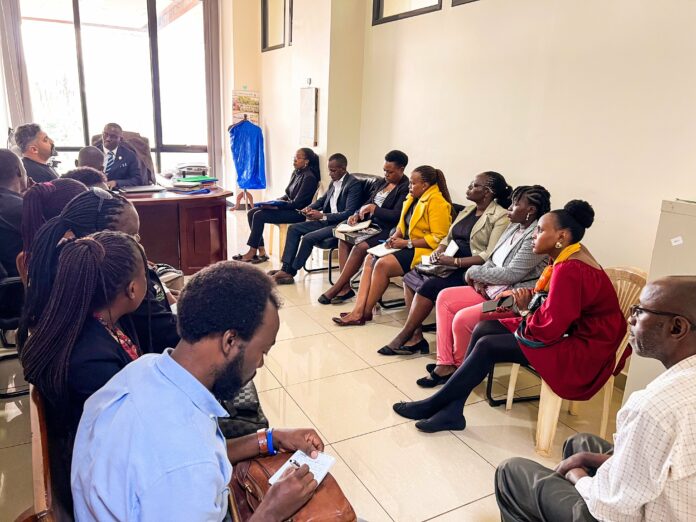By Watchdog Uganda
The Equal Opportunities Commission (EOC), in line with its mandate under Article 32 of the Constitution of Uganda, held its first mediation session on Tuesday 22nd October 2024 to address a case involving Summa Construction Company, a Turkish company constructing a stadium in Hoim and a local worker.
The company stands accused of dismissing Daphine Kabusingye, an employee, based on her HIV status, after requiring local workers to undergo mandatory HIV testing.
Presiding over the session was Commissioner Kakooza Xavier Ntensibe, who facilitated discussions aimed at resolving the dispute amicably. The case, which has drawn attention from various human rights and legal advocacy groups, highlights critical issues regarding workplace discrimination against persons living with HIV.
Counsel Kamagara Editah, representing the Alliance of Women Advocating for Change (AWAC), emphasized the significance of the case in advancing justice for marginalized groups. “As we continue to push for justice, this hearing is a firm reminder of our commitment to ensuring zero discrimination for all marginalized persons, particularly those living with HIV,” she stated. Kamagara further emphasized that such practices violate the right to work without discrimination, a cornerstone of human rights law.
The legal team from Uganda Network on Law, Ethics, and HIV/AIDS (UGANET), led by Counsel Gracious Atuhaire, presented the case on behalf of Daphine. “This case involves Summa Construction Company in Hoima, which terminated the employment of an HIV-positive woman after subjecting all local workers to mandatory HIV testing. Such actions are unacceptable under Uganda’s laws, and we are here to ensure justice is served,” Atuhaire remarked during the proceedings.
According to Atuhaire, the company indicated its willingness to engage in an amicable settlement, a move that was considered by Commissioner Kakooza. The commissioner allowed the parties to explore mediation, and a follow-up session has been scheduled for 31st October 2024. “The company expressed an interest in reaching an amicable solution, and the commissioner has granted them this opportunity. We remain hopeful that this process will yield a fair outcome for all involved,” Atuhaire noted.
If the mediation does not lead to a resolution, the matter will be referred to the EOC tribunal for further adjudication. The case has attracted support from various legal and civil society organizations advocating for the rights of persons living with HIV, signalling its importance as a precedent in the fight against workplace discrimination.
Both counsels reaffirmed their commitment to ensuring the protection of human rights and upholding the principle of equal opportunities for all.
Meanwhile, Commissioner Kakooza pledged to formally request the accused company to submit all relevant labour policies for review. He also urged both parties to make productive use of the next six days to reach a mutually beneficial resolution.
Case Background
Daphine Kobusingye, a 39-year-old single mother of four, found herself facing discrimination after just three weeks of working as a laundry attendant for Summa. Despite feeling respected in her role, her life was upended when a Turkish chef ordered all black workers to undergo medical check-ups. During the examination, Daphine revealed she had been on PrEP for seven years due to her HIV status.
Without her consent, her confidential medical information was disclosed to management. The next day, Daphine was fired, with her employer citing her HIV status as the reason. Despite her desperate pleas to be reassigned, she was dismissed in a humiliating manner, leaving her devastated and rejected.
Civil societies are now demanding justice for Daphine Kobusingye, whose case highlights the mistreatment of local workers by foreign companies that exploit their lack of awareness of their rights. Daphine’s experience is just one example of the broader issue of discrimination and abuse faced by many workers in similar situations.



